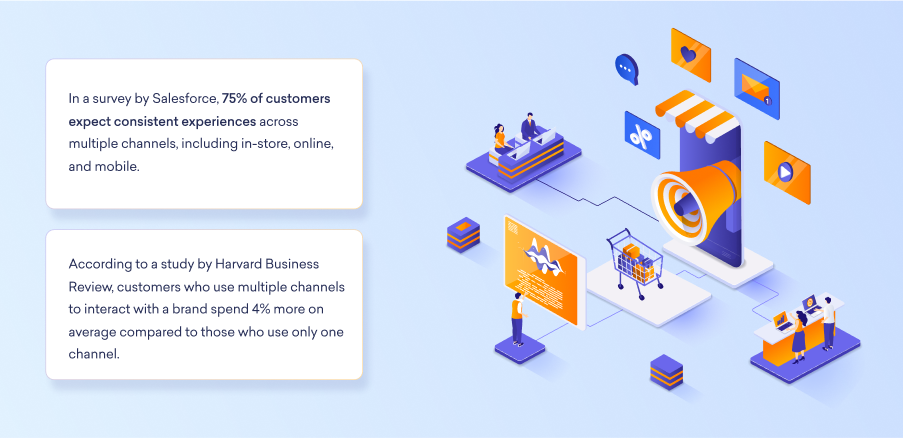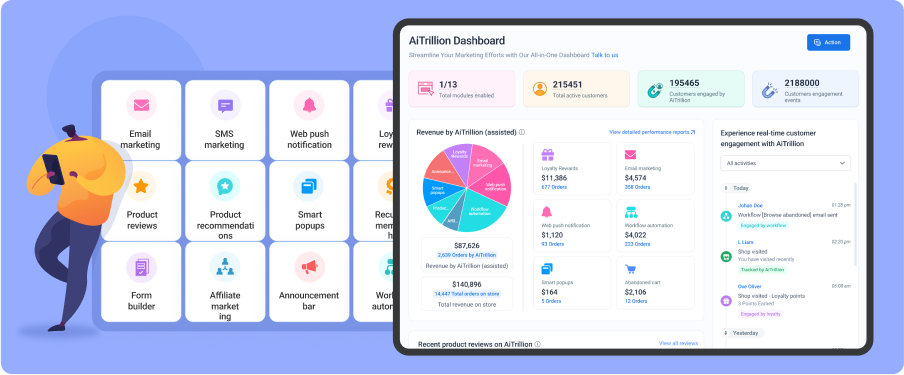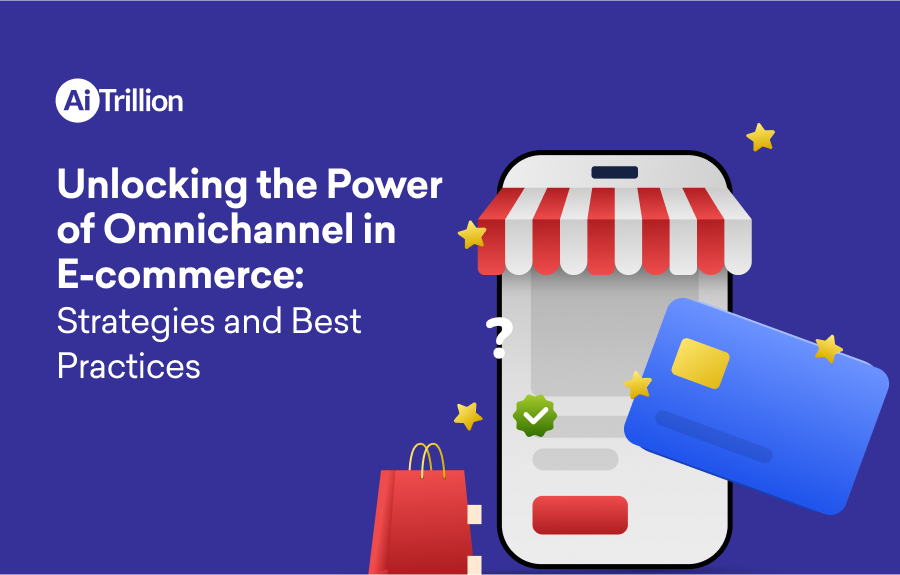- What is omnichannel marketing?
- The Importance of Omnichannel Marketing for Your eCommerce Business
- Advantages of Adopting an Omnichannel Marketing Strategy
- Omnichannel vs. Multichannel Marketing: What’s the Difference?
- Understanding Omnichannel Attribution and Its Function
- Trends in Omnichannel Marketing: Staying Ahead of the Curve
- Crafting an Omnichannel Campaign: Best Practices and Tips
- How Shopify Can Assist with Your Omnichannel Marketing Efforts
- How AiTrillion can Assist with your Omnichannel Marketing Efforts?
What is Omnichannel Marketing?
Omnichannel marketing is a strategy that seeks to create a seamless and integrated shopping experience for customers across multiple channels, including online and offline touchpoints. By aligning marketing and sales efforts across all channels, businesses can provide a consistent and personalized shopping experience for customers, regardless of how they choose to interact with the brand. This approach involves using customer data and insights to create a holistic view of the customer, and then delivering relevant and personalized messaging and offers across all touchpoints. The goal of omnichannel marketing is to create a cohesive and memorable brand experience that drives customer engagement, loyalty, and ultimately, sales.
Here are some key points to keep in mind about omnichannel marketing:
- Creates a seamless and integrated shopping experience across multiple channels
- Aligns marketing and sales efforts to provide a consistent and personalized shopping experience
- Uses customer data to create a holistic view of the customer
- Delivers relevant and personalized messaging and offers across all touchpoints
- Drives customer engagement, loyalty, and sales.
 According to a study by Harvard Business Review, customers who use multiple channels to interact with a brand spend 4% more on average compared to those who use only one channel.
According to a study by Harvard Business Review, customers who use multiple channels to interact with a brand spend 4% more on average compared to those who use only one channel.- In a survey by Salesforce, 75% of customers expect consistent experiences across multiple channels, including in-store, online, and mobile.
- E-commerce sales are expected to reach over $4.9 trillion by 2025, and omnichannel strategies are becoming increasingly important for businesses looking to capture a share of this market.
- The top-performing companies in terms of the omnichannel strategy include Amazon, Walmart, Target, and Nordstrom, according to a report by Multichannel Merchant.
The Importance of Omnichannel Marketing for Your eCommerce Business
Omnichannel marketing has become increasingly important for eCommerce businesses in today’s digital landscape. Customers today expect a seamless and integrated shopping experience across multiple channels and businesses that fail to deliver risk losing out on sales and customer loyalty. Here are some reasons why omnichannel marketing is crucial for your eCommerce business:
- Enhanced Customer Experience: Omnichannel marketing creates a seamless and integrated shopping experience for customers, regardless of how they choose to interact with your brand. This enhances the customer experience and can drive customer loyalty and repeat business.
- Improved Customer Insights: By collecting data across all touchpoints, businesses can gain a deeper understanding of their customers and their preferences. This data can then be used to deliver more personalized and relevant messaging and offers.
- Increased Sales and Revenue: Omnichannel marketing can lead to increased sales and revenue by providing customers with multiple touchpoints to engage with your brand. This can include online and offline channels, as well as mobile and social media platforms.
- Competitive Advantage: Businesses that successfully implement omnichannel marketing strategies have a competitive advantage over those that do not. By meeting the needs and preferences of customers, these businesses can stand out in a crowded marketplace.
- Brand Consistency: Omnichannel marketing ensures that your brand messaging and offers are consistent across all touchpoints, which can help build trust and credibility with customers.
According to research, companies with strong omnichannel strategies see a 91% higher year-over-year increase in customer retention rates compared to those without. Additionally, companies that implement omnichannel strategies achieve 90% higher customer retention rates compared to those that don’t.
Advantages of Adopting an Omnichannel Marketing Strategy
Omnichannel marketing is a powerful strategy for eCommerce businesses to engage with their customers, build stronger relationships, and drive more sales.
Adopting an omnichannel marketing strategy offers numerous advantages for businesses looking to grow and stay competitive in today’s digital landscape. Here are some key advantages of adopting an omnichannel marketing strategy:
- Enhanced Customer Experience: By creating a seamless and integrated shopping experience across multiple channels, businesses can enhance the customer experience and build customer loyalty.
- Increased Sales and Revenue: By providing customers with multiple touchpoints to engage with your brand, businesses can increase sales and revenue.
- Improved Customer Insights: Omnichannel marketing provides businesses with valuable customer data across all touchpoints, which can be used to gain insights and deliver more personalized and relevant messaging and offers.
- Brand Consistency: Omnichannel marketing ensures that your brand messaging and offers are consistent across all touchpoints, which can help build trust and credibility with customers.
- Competitive Advantage: Businesses that successfully implement omnichannel marketing strategies have a competitive advantage over those that do not. By meeting the needs and preferences of customers, these businesses can stand out in a crowded marketplace.
- Greater Flexibility: Omnichannel marketing provides businesses with greater flexibility to adapt to changing market conditions and customer preferences.
Omnichannel vs. Multichannel Marketing: What’s the Difference?
Omnichannel and multichannel marketing are two different approaches to reaching customers across multiple channels. While both strategies involve targeting customers across different touchpoints, they differ in how they integrate these touchpoints to create a seamless shopping experience.
Multichannel marketing involves using multiple channels to reach customers, but these channels operate independently of each other. For example, a business might have a website, a physical store, and a social media presence, but each of these channels operates independently and may not be integrated with one another.
On the other hand, omnichannel marketing aims to create a seamless and integrated shopping experience for customers across all channels. This approach involves aligning marketing and sales efforts across all channels to provide a consistent and personalized shopping experience for customers. By using customer data and insights to create a holistic view of the customer, businesses can deliver relevant and personalized messaging and offer across all touchpoints, resulting in a cohesive and memorable brand experience.
Table:
| Multichannel Marketing | Omnichannel Marketing |
|---|---|
| Uses multiple channels to reach customers | Creates a seamless and integrated shopping experience for customers |
| Channels operate independently of each other | Aligns marketing and sales efforts across all channels |
| May not be integrated with one another | Provides a consistent and personalized shopping experience for customers |
| Does not provide a seamless shopping experience | Uses customer data and insights to create a holistic view of the customer |
| Can be effective for reaching customers across multiple channels | Results in a cohesive and memorable brand experience |
 In short, while both approaches involve using multiple channels to reach customers, omnichannel marketing takes it a step further by creating a seamless and personalized experience across all channels.
In short, while both approaches involve using multiple channels to reach customers, omnichannel marketing takes it a step further by creating a seamless and personalized experience across all channels.
How Does Omnichannel Attribution Work?
Omnichannel attribution is the process of assigning credit for a conversion to the appropriate marketing channel(s) that led to the sale. It’s an important aspect of omnichannel marketing, as it allows businesses to understand which channels are driving the most sales and revenue, and optimize their marketing efforts accordingly.
Omnichannel attribution works by tracking and analyzing customer behavior across all touchpoints, including online and offline channels. This involves collecting and analyzing data from various sources, such as website analytics, point-of-sale systems, and customer relationship management (CRM) software.
To attribute a sale to the appropriate channel(s), omnichannel attribution uses different models, including:
- First-touch attribution: This model attributes the sale to the first touchpoint the customer encountered before making a purchase.
- Last-touch attribution: This model attributes the sale to the last touchpoint the customer encountered before making a purchase.
- Linear attribution: This model assigns equal credit to each touchpoint the customer encounters before making a purchase.
- Time-decay attribution: This model assigns more credit to touchpoints that occurred closer in time to the sale.
- Custom attribution: This model allows businesses to customize the attribution model to fit their specific needs and goals.
By using an omnichannel attribution model, businesses can gain valuable insights into which channels are driving sales and revenue, and optimize their marketing efforts accordingly. This can lead to increased sales, improved customer engagement, and a better return on investment (ROI) for their marketing efforts.
Trends in Omnichannel Marketing: Staying Ahead of the Curve
Omnichannel marketing is a constantly evolving field that requires businesses to stay up to date with the latest trends and technologies.
Customers expect personalized experiences. In fact, 80% of customers are more likely to purchase from a brand that provides personalized experiences. Brands are using AI-powered tools to provide personalized recommendations and experiences to their customers.
Here are some key trends in omnichannel marketing to watch for:
- Voice Commerce: As smart speakers and virtual assistants become increasingly common, voice commerce is becoming an important channel for businesses to reach customers.
- Social Commerce: Social media platforms are becoming more integrated with eCommerce, allowing businesses to reach customers where they spend their time online.
- Augmented Reality: Augmented reality technology is enabling businesses to create immersive and interactive shopping experiences for customers, allowing them to visualize products in real-world environments.
- Personalization: Personalization continues to be a key trend in omnichannel marketing, as businesses seek to deliver more relevant and personalized messaging and offer to customers.
- Data Privacy: With increasing concerns around data privacy, businesses need to ensure that they are collecting and using customer data in a responsible and ethical manner.
- Sustainability: Consumers are increasingly concerned about environmental and social issues, and businesses are responding by incorporating sustainability into their marketing efforts.
Crafting an Omnichannel Campaign: Best Practices and Tips
Crafting a successful omnichannel campaign requires a strategic approach that integrates multiple channels to create a cohesive and memorable brand experience for customers. Here are some best practices and tips to keep in mind when crafting an omnichannel campaign:
- Define Your Goals: Before launching an omnichannel campaign, it’s important to define your goals and objectives. Are you looking to drive sales, increase brand awareness, or build customer loyalty? Defining your goals upfront will help you tailor your campaign to achieve the desired outcomes.
- Know Your Customer: Understanding your target audience is key to crafting an effective omnichannel campaign. Collecting data and insights across all touchpoints can help you gain a deeper understanding of your customers’ preferences and behaviors, and tailor your messaging and offers accordingly.
- Create a Cohesive Brand Experience: An effective omnichannel campaign should provide a cohesive brand experience across all touchpoints. This means aligning your messaging and offers across all channels to create a seamless and integrated shopping experience for customers.
- Use Personalization: Personalization is a key trend in omnichannel marketing, and for good reason. By using customer data to deliver more personalized messaging and offers, businesses can drive engagement and loyalty, and ultimately, increase sales and revenue.
- Leverage Multiple Channels: An effective omnichannel campaign should leverage multiple channels to reach customers where they are. This can include online and offline channels, such as email, social media, in-store displays, and more.
- Test and Optimize: Testing and optimizing your omnichannel campaign is crucial to its success. This involves collecting data and insights on customer behavior and using this information to refine your messaging, offers, and channel mix over time.
- Measure Your Results: Measuring the effectiveness of your omnichannel campaign is essential to understanding its impact on your business. By tracking key metrics, such as sales, customer engagement, and ROI, you can gain insights into what’s working and what’s not, and make data-driven decisions to optimize your campaign.
In conclusion, crafting an effective omnichannel campaign requires a strategic approach that leverages multiple channels to create a cohesive and personalized brand experience for customers. By defining their goals, understanding their target audience, creating a cohesive brand experience, using personalization, leveraging multiple channels, testing and optimizing, and measuring their results, businesses can craft successful omnichannel campaigns that drive engagement, and loyalty, and ultimately, grow their business.
How Shopify Can Assist with Your Omnichannel Marketing Efforts
Shopify is a powerful eCommerce platform that can assist with your omnichannel marketing efforts. Here are some ways Shopify can help you create a seamless and integrated shopping experience for customers across multiple channels:
- Integrations: Shopify integrates with a wide range of third-party tools and platforms, such as social media, email marketing, and point-of-sale systems. This allows businesses to leverage multiple channels to reach customers where they are.
- Mobile-Friendly: Shopify is optimized for mobile, allowing businesses to create mobile-friendly websites and apps that provide a seamless shopping experience for customers on the go.
- Personalization: Shopify provides a range of personalization features, such as product recommendations and targeted messaging, that businesses can use to deliver more relevant and personalized messaging and offers to customers.
- Analytics: Shopify provides robust analytics and reporting tools that businesses can use to track customer behavior across all touchpoints, and gain insights into what’s working and what’s not.
- POS Integration: Shopify integrates with a range of point-of-sale systems, allowing businesses to track sales and inventory across both online and offline channels.
- Multi-Channel Selling: With Shopify, businesses can sell across multiple channels, such as social media and marketplaces, from a single platform. This allows businesses to reach customers where they are and drive sales across multiple channels.
- Easy Management: Shopify’s intuitive and user-friendly interface makes it easy for businesses to manage their omnichannel marketing efforts from a single platform.
How AiTrillion can Assist with your Omnichannel Marketing Efforts?
AiTrillion is the perfect tool for eCommerce sellers who want to optimize their omnichannel marketing efforts. With 11+ powerful features, AiTrillion makes it easy to automate and streamline your marketing strategy.
 AiTrillion is a comprehensive eCommerce marketing platform that can assist with your omnichannel marketing efforts. Here are some ways AiTrillion can help you create a seamless and integrated shopping experience for customers across multiple channels:
AiTrillion is a comprehensive eCommerce marketing platform that can assist with your omnichannel marketing efforts. Here are some ways AiTrillion can help you create a seamless and integrated shopping experience for customers across multiple channels:
- Integrations: AiTrillion integrates with a wide range of third-party tools and platforms, such as social media, email marketing, and SMS marketing. This allows businesses to leverage multiple channels to reach customers where they are.
- Customer Segmentation: AiTrillion provides powerful customer segmentation tools that allow businesses to segment their customers based on a wide range of attributes, such as purchasing behavior, demographics, and more. This allows businesses to deliver more personalized messaging and offers to customers across multiple channels.
- Personalization: AiTrillion provides a range of personalization features, such as product recommendations and targeted messaging, that businesses can use to deliver more relevant and personalized messaging and offers to customers.
- AI-Driven Automation: AiTrillion’s AI-driven automation features enable businesses to automate many of their marketing tasks, such as email marketing and social media posting. This allows businesses to save time and resources while delivering more timely and relevant messaging to customers.
- Analytics: AiTrillion provides robust analytics and reporting tools that businesses can use to track customer behavior across all touchpoints, and gain insights into what’s working and what’s not. This allows businesses to make data-driven decisions to optimize their omnichannel marketing efforts.
- Multi-Channel Selling: With AiTrillion, businesses can sell across multiple channels, such as social media and marketplaces, from a single platform. This allows businesses to reach customers where they are and drive sales across multiple channels.
- Customer Loyalty: AiTrillion’s customer loyalty features enable businesses to create and manage customer loyalty programs that reward customers for their purchases and engagement. This helps businesses build customer loyalty and increase customer lifetime value.
Omnichannel marketing is becoming increasingly important for businesses looking to meet customer expectations and drive sales and revenue. By providing a seamless and integrated shopping experience across multiple channels, businesses can better engage customers, build loyalty, and ultimately, grow their business.
To succeed in omnichannel marketing, businesses must adopt a strategic approach that leverages multiple channels, provides a cohesive brand experience, and incorporates personalization and customer data. By defining goals, understanding their customers, leveraging multiple channels, and measuring results, businesses can optimize their omnichannel campaigns and drive better results.
Platforms like Shopify and AiTrillion are powerful tools that can assist businesses with their omnichannel marketing efforts. With integrations, mobile optimization, personalization features, AI-driven automation, analytics, multi-channel selling, and customer loyalty features, these platforms provide businesses with the tools they need to create a seamless and integrated shopping experience for customers across multiple channels.
However, as omnichannel marketing continues to evolve, businesses must stay ahead of the curve and embrace new trends and technologies, such as voice commerce, social commerce, augmented reality, and gamification. By staying ahead of these trends and incorporating them into their omnichannel marketing strategies, businesses can better meet customer expectations, drive engagement and loyalty, and ultimately, grow their business.
In conclusion, omnichannel marketing is a key trend in eCommerce that businesses must embrace to stay competitive and meet customer expectations. By adopting a strategic approach, leveraging the right tools and platforms, and staying ahead of the curve with new trends and technologies, businesses can create a seamless and integrated shopping experience for customers, drive engagement and loyalty, and ultimately, grow their business.
With AiTrillion, you can easily connect with customers across multiple channels, increasing engagement and ultimately boosting your sales.



Leave a Comment
You must be logged in to post a comment.